16 Countries with No Income Tax
June 11, 2025
At Nomad Capitalist, our motto is simple: go where you’re treated best.
But finding that place can be complicated, so a major part of going where you’re treated best is choosing the places that suit your personal preferences.
You may enjoy the hustle and bustle of big-city living, long for sunshine and sand, and wish to banish the spectre of winter forever.
Maybe you’re seeking cultural experiences, culinary delights and travel opportunities.
Or, perhaps you just want a ‘Plan B’ second residency as a backup strategy?
Whatever you want, as a high-net-worth individual, you need to weave asset protection and investment opportunities together in a plan that allows you to keep more of your wealth for you and your family to enjoy.
That’s why, in our experience, some factors – like paying low or zero taxes – are crucial.
Simply put, if you’re losing a good chunk of your income to taxes, then you’re not where you’re treated best.
But what does that mean in the context of all the global destinations you could choose for planting flags and what does it mean when talking about paying no income tax?
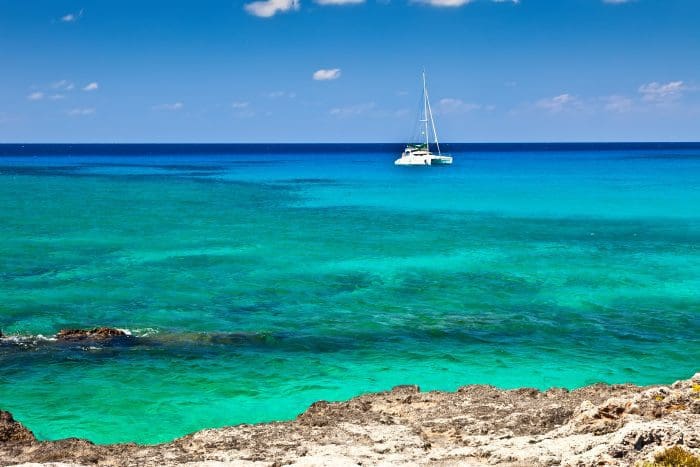
How Can a Country Have No Income Tax?
As a citizen of a high-tax country like the United States or Australia, you might wonder how countries with no income tax make ends meet.
The answer is simple: other sources of revenue.
To see how this works, look at two US states with no state-level income tax – Alaska and Nevada.
Alaska is a major oil producer, so roughly 90% of its revenue comes from the oil and gas industry.
Surprisingly, Alaska even shares its oil money with its residents through a permanent fund: a family of four living in the state receives roughly US$13,000 per year.
Alaska and oil-rich countries like Oman and Qatar have no need to levy an income tax thanks to this high revenue source.
In fact, if it weren’t for federal taxes and bitterly cold winters, Alaska could become a popular destination for Nomad Capitalists.
Nevada, on the other hand, doesn’t have much in the way of natural resources. However, it does generate enough revenue from tourism to support its government without resorting to imposing an income tax.
Countries with no income tax, like the Bahamas and Maldives, fund their governments in the same way. Since they bring in plenty of money from tourism, they can allow residents to live there tax-free.
Low Taxes vs No Taxes

Although substantially reducing your global tax rate is possible, you don’t need to limit yourself to countries with no income tax to achieve this.
Since only a handful of zero-income-tax countries exist, you can also spend time in low-tax countries. Low-tax and no-tax countries are functionally similar, but they use separate types of tax systems.
Low-tax countries can use systems that only tax local sources of income. For example, Singapore’s territorial tax system attracts wealthy expats by only charging tax on local income – not foreign investments. Countries with a worldwide tax system, like Bulgaria, can also be low-tax.
Living tax-free in a country can give you more options as far as second residences go, but you could still end up paying taxes if you want to rent your property there or invest in a local business.
So with both low- and no-tax countries, it’s important to consider all of your options and their pros and cons before making a decision as to which you ultimately settle for.
16 Countries With No Income Taxes
There are plenty of countries with no income tax around the world. Keep in mind as you read our breakdown of each that you may not be able to get residence or citizenship in all of them, and some of them aren’t exactly the most liveable places to relocate to.
For more information on countries where you can establish residency and pay no taxes, take a look at our article: Get Second Residence and Pay No Tax in 25 Tax-Free Countries.
In the meantime, and in no particular order, here’s our list of no-income-tax countries.
The Bahamas
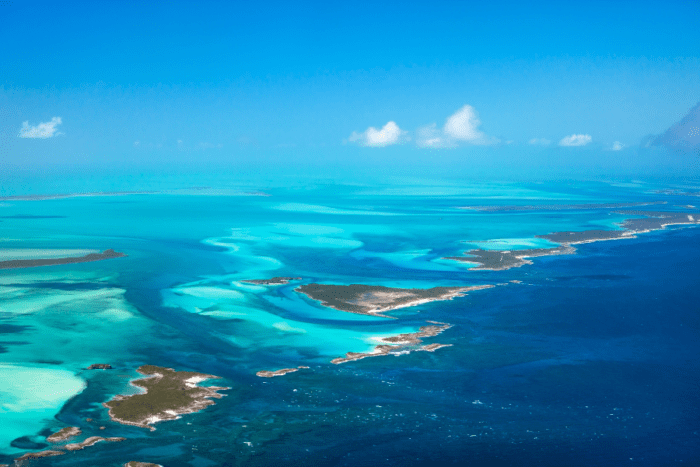
As one of the most popular tourist destinations in the world, it’s little wonder that the Bahamas doesn’t need to charge income tax to balance its books.
With its stunning beaches and developing economy, the Bahamas is one of the most liveable countries with no income tax. Establishing a second residence there is not too difficult either – as long as you have the money to invest.
Getting a temporary residence permit is as simple as paying US$1,000 at the immigration office and it’s renewable every year.
Recently, however, the Bahamas has started cracking down on foreign residents who use the temporary permit without making investments.
If you want to qualify for permanent residence, you’ll need to buy a property, and purchases worth at least $US750,000 will receive faster consideration.
As a general rule, the more money that you invest in the Bahamas, the more likely you’ll be treated favourably by the immigration office.
But while getting permanent residence is mostly a matter of investment, securing citizenship is another story. The country has flirted with a pricey citizenship by investment program, but nothing has come of it yet.
Apart from value added tax (VAT) and stamp duties, you won’t pay much in taxes to the Bahamas, but you’ll need to spend a substantial amount of money to live there. In the long run, though, it could be worth it to pay no income taxes while lounging on the beach.
Bahrain
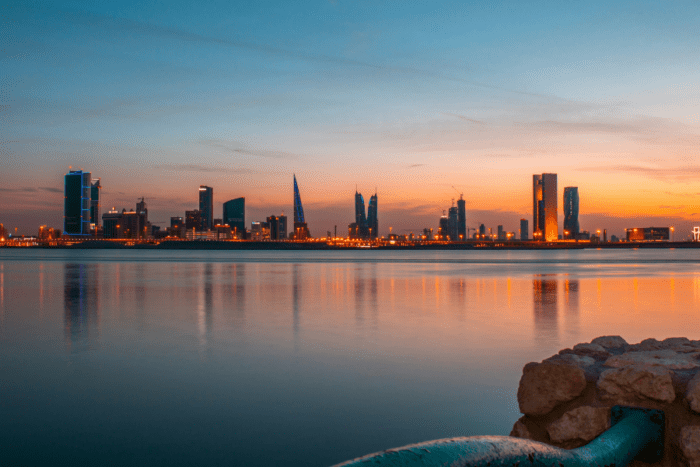
Bahrain was one of the first states in the Persian Gulf to discover oil within its borders, and that stroke of fortune has allowed this small Gulf state to become one of the wealthiest nations in the world. And, one of the handful of countries with no income tax.
It’s fairly easy to live there, and places like Manama, a well-developed city, have sizeable expat communities.
However, the problem with Bahrain, which is also common with many other Middle Eastern states, is that getting permanent residence can be difficult.
To establish permanent residence in Bahrain, you need to be retired, invest 50,000 Bahrain dollars (US$133,000) in property or 100,000 Bahrain dollars (US$266,000) in a local business.
But at least getting permanent residence in Bahrain is possible. Securing citizenship is much harder; among the major hurdles you’ll need to leap through, you’ll have to live here for 25 consecutive years and be fluent in Arabic before they’ll consider your application.
Bahrain, then, could be an option if you’re looking for a tax-free permanent residence in the Gulf. Just don’t set your heart on getting a second passport there.
Bermuda
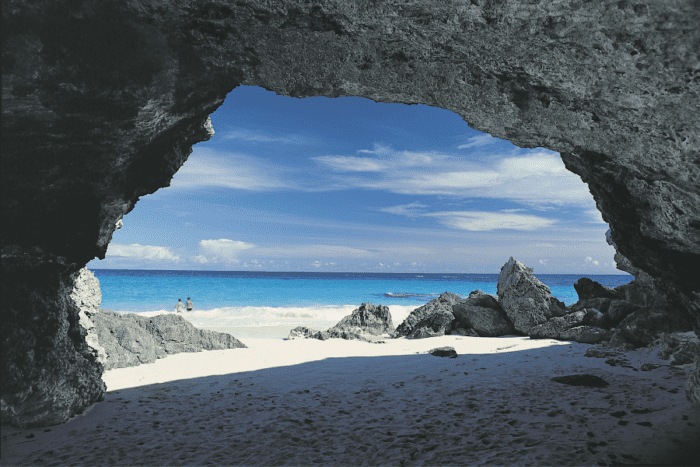
A British territory in the North Atlantic Ocean known for its pink-sand beaches and zero income tax, Bermuda has a population of just 64,000 residents.
It doesn’t have any permanent residence or citizenship by investment programs, but if you want to visit the island, you can stay for up to six months with a short-term permit visa. You can also live there on a work permit that’s usually issued for one to five years, and sometimes longer.
Do note that Bermuda does have a payroll tax. The main difference is that payroll tax is required by employers only, who may deduct up to 10.25% from employees’ salary that goes to said tax. And if you’re self-employed, you are required to pay the payroll taxes yourself.
Brunei

This tiny Sultanate on the Malaysian island of Borneo also has enough oil wealth to forego collecting income tax.
However, unlike Bahrain or the Bahamas, Brunei is extremely difficult to live in. It has a reputation of being unfriendly to foreigners and the government is, frankly, heavy-handed and dictatorial. You might even find fellow expats who are scared to speak to you thanks to local laws and policing practices.
Permanent residence and citizenship are also out of the question – unless you somehow gain the approval of the Sultan.
Brunei exemplifies how countries with no income tax are not necessarily hubs of economic freedom.
Cayman Islands

Like the Bahamas, the Cayman Islands’ scenic beaches draw in enough tourists to keep its government afloat without the need for income tax.
There are three ways to obtain residency in the Cayman Islands:
- Working for a Cayman Islands-based company
- Making a significant investment
- Establishing a business there.
You’ll need to earn 120,000 Cayman Island Dollars ( around US$145,000) per year and invest at least US$1.2 million in real estate or local companies if you want to live on Grand Cayman, and from there, you’ll need to wait another five years to apply for citizenship by naturalisation.
And, as in most Caribbean countries, the more money that you invest, the more easily you can obtain permanent residence. However, you can get away with investing a bit less if you choose to move to one of the less popular islands, like Cayman Brac.
Overall, the Cayman Islands is an interesting zero-tax option if you have substantial funds to invest.
Kuwait

Like many of the Gulf countries on this list, Kuwait doesn’t need to levy an income tax thanks to its large oil industry. It’s also one of the most expat-friendly countries in the world, with foreign citizens making up two-thirds of the population.
From our own experience, Kuwait City is highly Westernised and easy to navigate.
However, it doesn’t have much need for foreign investment, so citizenship by investment is out of the question. Obtaining permanent residency there generally requires you to have Kuwaiti relatives or formal employment within the country.
Living permanently in this particular tax-free haven, then, is near-impossible, so it’s advisable not to base your tax strategy on Kuwait.
Maldives

Imagine living in an overwater bungalow without paying a dime in income tax.
Well, you can technically do that in the Maldives, a small island country in the Indian Ocean: thanks to its plentiful – and expensive – resorts, the Maldives doesn’t see much need for an income tax.
However, while spending your days living tax-free in the Maldives sounds idyllic at first, staying there long-term is close to impossible.
You need to be a Sunni Muslim to even apply for citizenship or permanent residence and, even then, the country doesn’t have a program for foreigners to become permanent residents, let alone citizens.
There is one upside to this: while you’re lounging at the St Regis, at least you won’t have to worry about complicated triggering tax requirements.
Monaco

Monaco’s status as one of the world’s best countries with no income tax has turned it into a playground for the European elite.
This gorgeous country on the French Riviera is safe and luxurious, yet it charges its residents and citizens a total of zero income tax. Moreover, since the country tends to attract high-income, tax-averse types, it will likely remain tax-free for the foreseeable future.
Notably, it’s also one of the easier tax-free countries in which to become a citizen.
Although you’ll need to spend several million dollars to prove your wealth in order to become a resident, the residency process itself is fairly straightforward since it’s a popular destination for wealthy expats.
For those who prefer European glamour to island life, then living tax-free in Monaco may be the best choice. If you’re thinking of moving there, check out our ultimate guide to getting residency and citizenship in Monaco.
Nauru

Nauru is not really an island paradise, although it is one of the world’s tax-free countries.
Nauru is a small island country in the southwest Pacific Ocean that was first named ‘Pleasant Island’ by European sailors.
Unfortunately, however, the island doesn’t seem to quite live up to its original name.
Most people only know of Nauru for its recent media coverage as the location of a controversial Australian-run detention camp for asylum-seekers. And while Nauru certainly has many of the charming features that draw visitors to other Pacific islands, the island’s phosphate mining industry has decimated its economy.
If all that wasn’t bad enough, Nauru is also under threat of sinking into the Pacific Ocean, thanks to rising sea levels.
In fact, Nauru only makes the list of countries with no taxes because of its government’s last-ditch efforts to keep its economy afloat. If you’re looking for a peaceful tax haven in the South Pacific, Nauru may not be your best bet.
Oman

Like most Middle Eastern countries on this list, Oman has no need for an income tax thanks to its oil and gas industry.
Additionally, despite its massive oil and gas reserves, Oman has made a distinct effort to diversify its economy and open it up to new opportunities. This makes it a great alternative to the United Arab Emirates (UAE) for investors looking for opportunities in the Gulf.
As with most wealthy Middle Eastern states, Oman isn’t exactly dying for foreign capital, so expats looking to move there usually need strong connections in the country to do so easily.
Living there can also be a major adjustment since Omani culture is quite conservative. In fact, you need to obtain a personal liquor licence from a local police station to buy even a single bottle of wine.
The Omani Government offers an Investor Residence Visa on its website. However, specifics like minimum investments aren’t readily available and none of the lawyers we spoke to in Oman specialise in this area.
Oman is an interesting option, but living there long-term isn’t generally an option for Nomad Capitalists.
Qatar

At first glance, Qatar appears remarkably similar to its neighbours in the Arabian Gulf.
It’s a small, wealthy country that made its fortune through the oil industry. The country has a highly conservative culture but a mindset that’s rapidly modernising thanks to foreign investment and external business influences.
It may be small, but Qatar has one of the highest per capita income rates in the world and is regarded as the most developed country in the Middle East. It also plays a unique role in global and regional politics and, in its own right, is a fascinating country due to its particularly high level of development and growing role in world politics.
Overall, Qatar is a relatively peaceful and pleasant place to live and, unlike its Gulf neighbours, offers permanent residence for expats.
That said, like most countries with no income tax, it’s difficult for foreigners to attain permanent residence here since requirements are strict and few lawyers specialise in the area. To even be eligible, you must have lived in the country for over 20 years and have a good command of Arabic.
Saint Kitts and Nevis
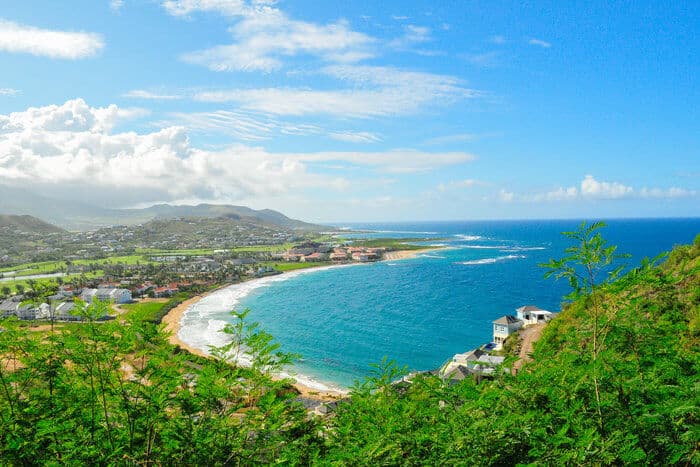
If you’re looking for a place to establish tax-free citizenship easily, look no further than St Kitts and Nevis.
The price tag of its citizenship by investment is also far lower than other citizenship by investment programs.
There are two citizenship-by-investment options: a donation of US$250,000 to the Sustainable Growth Fund or an investment in a government-approved real estate project starting at US$325,000.
While you can read more about the citizenship by investment program in St Kitts and Nevis here, it’s a relatively straightforward process that can take less than a year to complete. Reach out to our team to find out how.
Somalia

Remember when we mentioned that not all countries on this list are very liveable?
Somalia is – without question – one of those countries.
Insurgent groups like al-Shabab control large swaths of Somalian territory at the same time as the country is facing a devastating humanitarian crisis. Millions of people face acute food insecurity and the NGOs that can operate here are struggling to provide aid to vast areas, like those controlled by al-Shabaab, due to the fear of attacks.
Clan uprisings have been accompanied by a worsening drought, as al-Shabaab increases taxes and local clans rebel. In 2024, it’s estimated that around 6.9 million Somalis are in need of humanitarian assistance.
The ongoing conflicts mean that Somalia is far from a viable option and, even if the country manages to emerge from decades of conflict, such a development could well mean the end of its zero-tax status as it faces the prospect of repaying its foreign debts.
United Arab Emirates
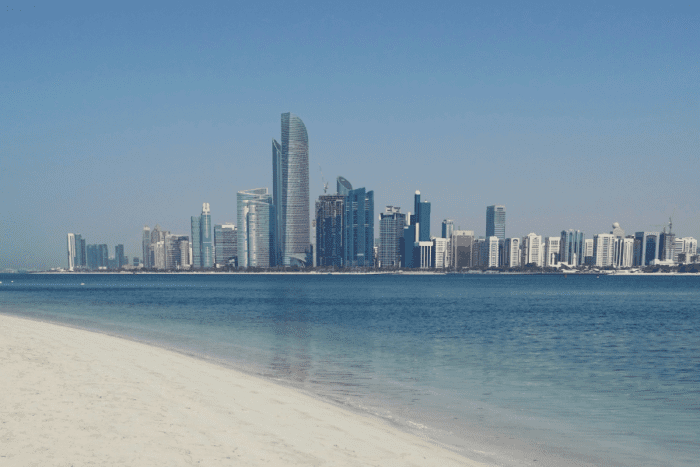
According to the Index of Economic Freedom, the United Arab Emirates is the 22nd-freest economy in the world. It’s also the first in the Middle East/North Africa region, thanks to its openness to trade and low taxes.
Like most of its neighbours, the UAE earns plenty of money from oil exports, so residents can live there tax-free. The government of the UAE openly encourages foreign investment and cities like Dubai are well-known for their entrepreneurial spirit.
It’s also one of the easier Gulf countries to live and invest in, especially in terms of safety and development. While it is a fairly conservative country, the UAE is multicultural and more tolerant than many of its neighbours.
Becoming a resident of the UAE is also easier than in other Gulf countries. While a permanent residence program for foreign investors does not exist, its visa policies are becoming easier to navigate. The government has even started to issue 10-year residence visas.
Most lawyers and long-term expats we’ve spoken to agree that if you maintain your investments, stay out of trouble and overcome local bureaucracy, you can live in the country for decades.
As an international hub for trade and finance, despite recently imposing a 9% tax on some corporations, the UAE is one of the more appealing countries on this list with no personal income tax.
Vanuatu

Vanuatu relies on tourism revenue to fund its government.
It’s also one of the few countries with no taxes where you can get a second passport quickly, easily and relatively cheaply. After a devastating cyclone ripped through Vanuatu in 2015, its government re-introduced its citizenship-by-investment program to help raise funds to rebuild the damage.
Today, Vanuatu’s citizenship by investment program is one of the easiest to navigate in the world. It costs significantly less than similar programs in the Caribbean and its passport has become considerably stronger over the past few years.
The major drawback to Vanuatu is getting there. Although there are a handful of inexpensive flights from hubs like Kuala Lumpur, travelling there is time-consuming and costly.
Still, this remains one of the easiest countries to access no income taxes, so going there may be worth the trouble.
Western Sahara

You probably won’t want to go to Western Sahara anytime soon, but it’s important to get a complete picture of all countries with no income tax.
Western Sahara, otherwise known as the Sahwari Republic, is an anomaly among these types of nations.
Although it’s technically a disputed territory, 36 countries have currently established diplomatic relations with it, and it is recognised as a full member of the African Union.
Its tax-free status is also something of an enigma: Western Sahara doesn’t have enough income from its natural resources to subsidise a tax-free state and it’s not a tourist hub, either.
Instead, Western Sahara’s tax-free status likely stems from its territorial disputes.
While Western Sahara isn’t a war zone, its unstable legal status makes living and investing there difficult – even for the most adventurous. Therefore, although Western Sahara has a favourable tax policy, we wouldn’t recommend living or investing there.
Countries Without Taxes: FAQs
Yes, there are countries with no income tax, such as the UAE, Monaco and the Bahamas. They fund their governments through other revenue sources like tourism, natural resources or corporate taxes.
Popular zero-income-tax countries include the UAE, Monaco, the Bahamas, Cayman Islands and St Kitts and Nevis. These countries attract expats and investors with tax-friendly policies and appealing lifestyles.
The UAE, Monaco and the Bahamas are often considered the best for foreigners due to their developed infrastructure, safety and relative ease of obtaining residency or long-term visas.
Countries like Monaco, the UAE and St Kitts and Nevis not only have no income tax but also avoid taxing dividend income, making them favourable destinations for investors.
The UAE and St Kitts and Nevis are among the easiest to move to, offering straightforward residency or citizenship-by-investment programs.
To move to a 0% tax country long-term, you’ll need to secure a residency or citizenship. Each country has different regulations as far as who is eligible for these.
The United Arab Emirates recently introduced a 9% corporation tax, but there is still no personal income tax charged.
No, Switzerland taxes its residents up to 11.5% on personal income. Corporation tax is charged at 8.5%
The Bahamas charges no income tax to its residents and is regarded as one of the most liveable countries to adopt this policy.
Antigua and Barbuda, the Bahamas, Bermuda, the Cayman Islands, the British Virgin Islands, St Kitts and Nevis and Turks and Caicos are among the Caribbean countries that charge no income tax.
Portugal had a non-habitual residency which helped expats to legally avoid paying income tax, but this is disappearing. Portuguese tax residents will pay up to 48% tax on personal income.
Should You Move to a Country with No Income Tax?
If you’re tired of losing a good portion of your income to taxes, then moving to a country with no income tax is tempting.
However, actually moving to one of these places is easier said than done.
If you’re a US citizen, you’ll still have to contend with Uncle Sam yearly unless you renounce.
You’re also limited in where you can go and stay long-term.
Gulf states tend to favour employed expats over foreign investors while tourist hubs usually require a large investment to live there.
Ease of access is part of going where you’re treated best and, unfortunately, not many countries with no taxes fit that bill.
These kinds of limitations are why we often recommend tax-free second residences.
Territorial tax countries like Malaysia are often much easier to establish residence in than countries with no taxes.
However, if you’re dead set on living in one of these countries with no taxes, you can get citizenship quickly by investing in Saint Kitts and Nevis or Vanuatu.
With some planning and flexibility, you should be able to achieve the dream of living tax-free.
Reach out to us – it’s what we do, so get in touch with the Nomad Capitalist team to find out how.


Does Puerto Rico Pay Taxes to the US?
It’s a common question and one that often fuels confusion, debate, and a fair share of misinformation – Do residents of Puerto Rico actually pay US federal taxes? When most people think of US tax obligations, they naturally assume they apply uniformly across all US citizens. But when it comes to Puerto Rico, things are […]
Read more

How to Get UAE Citizenship – The Complete Guide
Sovereignty – both national and personal – shapes ambition, secures wealth, and defines status in a shifting global order. For the high-achieving global citizen, acquiring a second or even third passport is more than a lifestyle upgrade; it’s a strategic move in long-term financial and geopolitical positioning. But not all citizenships are created equal – […]
Read more

A Gateway to Central Asia: New Kazakhstan Golden Visa Program for 2025
Central Asia just raised the stakes in the golden visa game. In May 2025, Kazakhstan officially launched a 10-year Golden Visa program in an ambitious move to position the country as a serious contender in the global investor migration space. At a time when other international regions are rolling back their citizenship and residency options, […]
Read more




